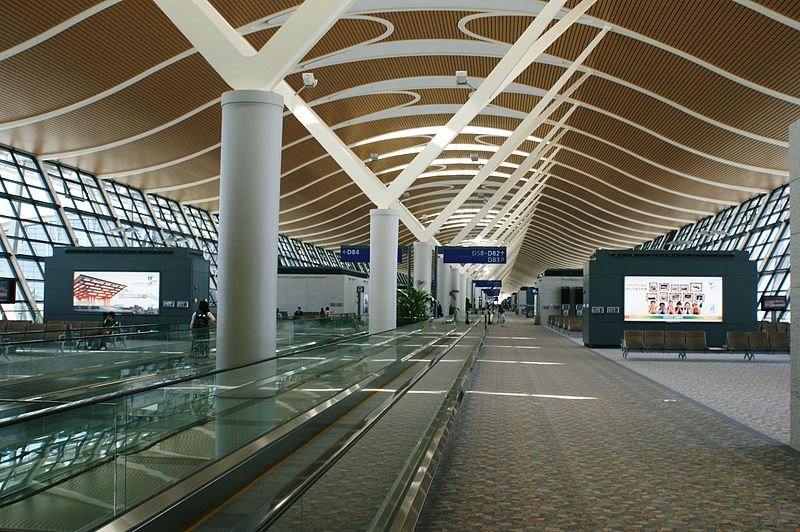 Shanghai Pudong International Airport
Shanghai Pudong International AirportSource: http://commons.wikimedia.org/wiki/File:Shanghai_Airport_(6052897591).jpg
Author: Hugh Llewelyn

Shanghai Pudong International Airport (PVG) is the main international airport serving the city of Shanghai, China. This high-tech facility receives the bulk of international flights for Shanghai, while the older Shanghai Hongqiao International Airpot (SHA) today receives mostly domestic flights. In this user guide to Pudong International Airport, I want to explain how to use this airport so that you will enjoy a smooth experience here.
Location of Pudong International Airport
Pudong International Airport is 30 km (19 mi) from downtown Shanghai. In comparisan, the Hongqiao Airport is just 13 km (8 mi) away. As air traffic to Shanghai is split between two airports, Pudong is the third largest international airport in China behind the Beijing Capital International Airport and Guangzhou Baiyun International Airport, both of which I am describing soon.You can see from the map below that Pudong International Airport is located to the east of downtown Shanghai while Hongqiao International Airport to the west. This makes transits between airports a time-consuming challenge.
View Pudong International Airport location in a larger map
Layout of Pudong International Airport
Pudong International Airport is laid out in the form of the letter H, with two parallel contact piers for aerobridges. The western contact pier connects to Terminal 1 (opened in 1999) while the eastern contact pier connects to Terminal 2 (opened in 2008). The two contact piers have a total of 70 aerobridges and 218 aircraft parking bays. There are three operational runways, with another two having been approved for construction.Terminal 1 faces west. It has 28 departure gates. It presently has a capacity of 20 million passengers a year. The roof is in the form of waves.
Terminal 2, facing east, has a capacity of 40 million passengers. It has three levels. Level 1 is for domestic departures and arrivals.
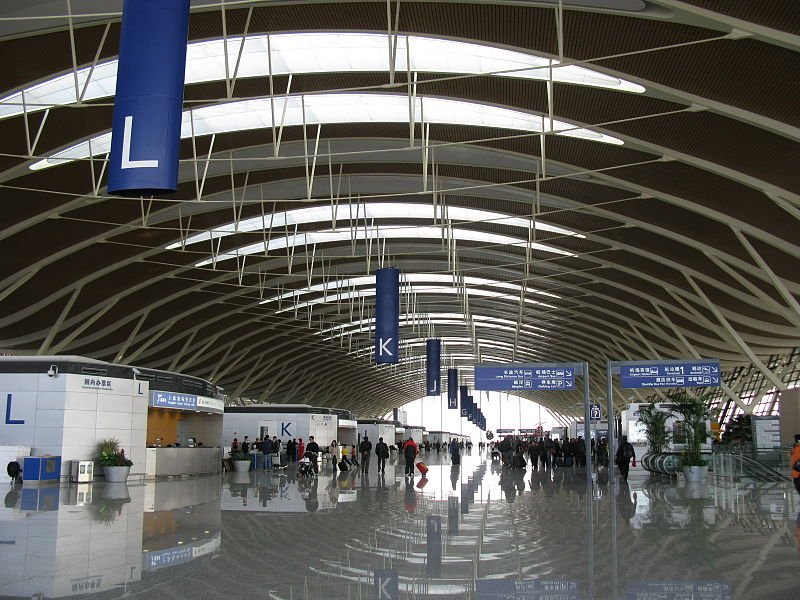 Shanghai Pudong International Airport Terminal 2
Shanghai Pudong International Airport Terminal 2Source: http://commons.wikimedia.org/wiki/File:Pudong_International_Airport_Terminal_2.jpg
Author: Baycrest

The Yingbin Expressway (S1) passes on either sides of the central concourse between Terminal 1 and 2 to form a loop with other expressways. It exits the terminal heading north, then curves to the west in the direction of downtown Shanghai, where it connects with the Outer Ring Expressway (S20). In the other direction, it continues south to connect with Shenjiahu Expressway (S32).
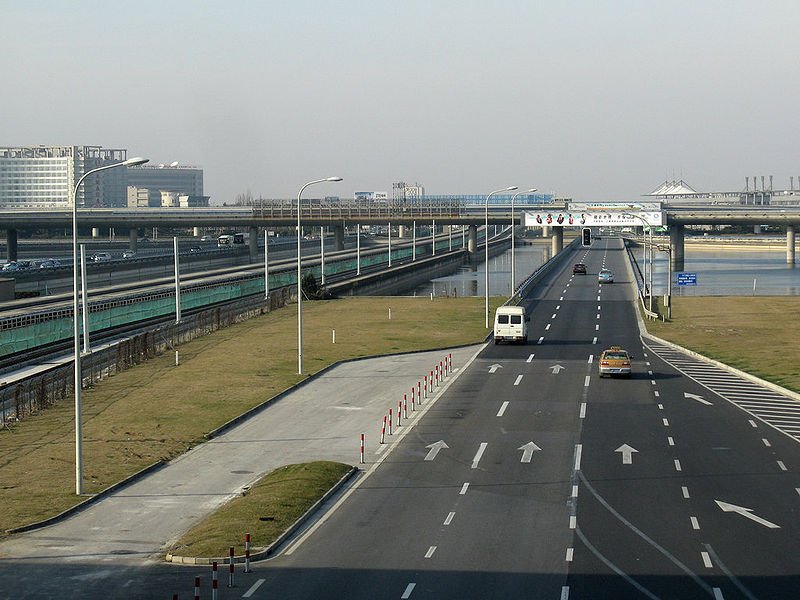 Yingbin Expressway, Shanghai
Yingbin Expressway, ShanghaiSource: http://commons.wikimedia.org/wiki/File:A1_Expressway.jpg
Author: Baycrest

The Maglev Train elevated line likewise exits the terminal heading north, then curves to the west, parallel to thye Yingbin Expressway. After the Wanlongzhuang Interchange, the maglev curves north to end at Longying Road Station.
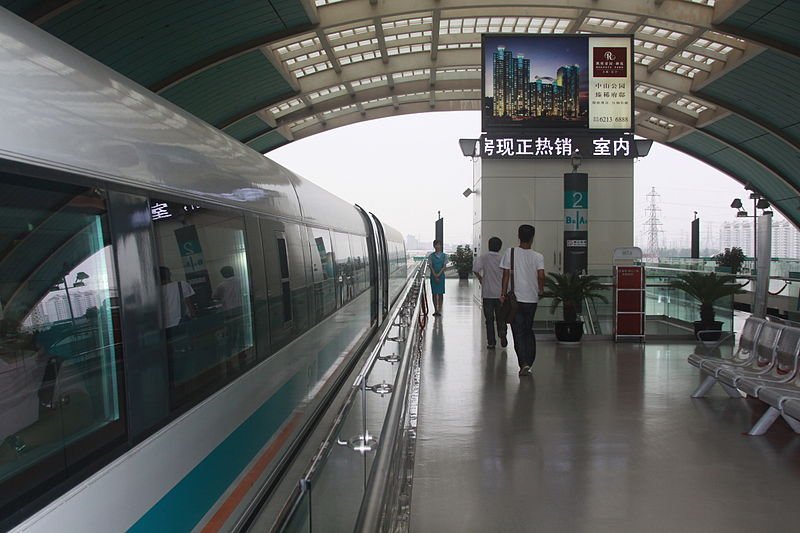 The Maglev Train at the Longyang Road Station in Shanghai. The lady standing by the train is an attendant welcoming passengers on board.
The Maglev Train at the Longyang Road Station in Shanghai. The lady standing by the train is an attendant welcoming passengers on board.Source: http://commons.wikimedia.org/wiki/File:Shanghai.Maglev.Train.Longyang.Road.Station.jpg
Author: Jrsmooth

Arriving at Pudong International Airport
TaxiThis is definitely the option if you want to be taken right to the doorstep of your destination. It's the priciest, of course. The fare to People's Square in downtown Shanghai will set you back RMB 150, a journey of close to an hour. If there're four of you, then the divided cost makes this option worthwhile.
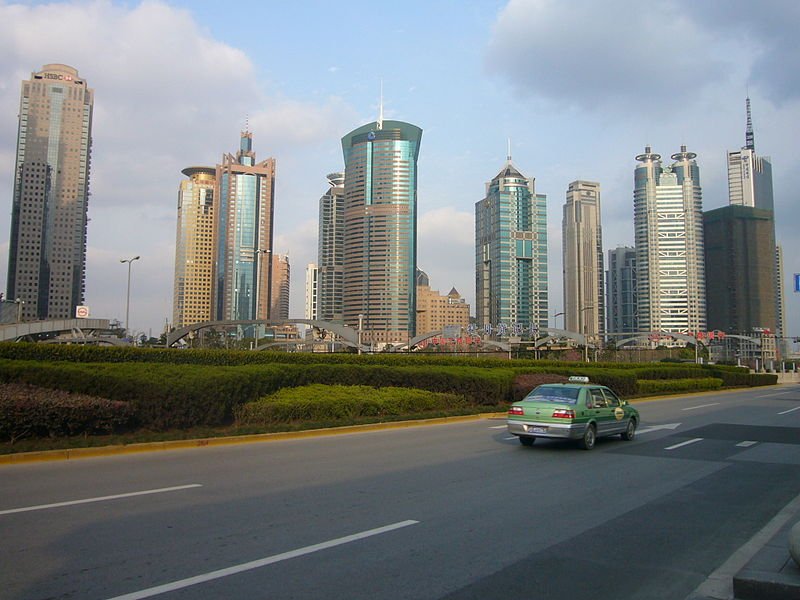 Taxi on the street in Pudong
Taxi on the street in PudongSource: http://commons.wikimedia.org/wiki/File:Buildings_in_Pudong_-_2007_-_01.JPG
Author: Jordiferrer

Shuttle Bus
There are ten shuttle bus routes connecting Pudong International Airport with downtown Shanghai. In addition, there are also bus services to Hongqiao International Airport, as well as to Hangzhou, Suzhou and other nearby cities.
Maglev Train
Okay, it's fast and it's high tech, but personally I find it to be a lot of hassle for nothing. I mean, the maglev goes to Longyang Road Station, on the southeastern part of downtown Pudong. From there, you still have to take the subway or taxi to reach downtown Shanghai (if that's where you're heading). And the fare of RMB 50 one way or RMB 80 round trip doesn't make this a budget-conscious option.
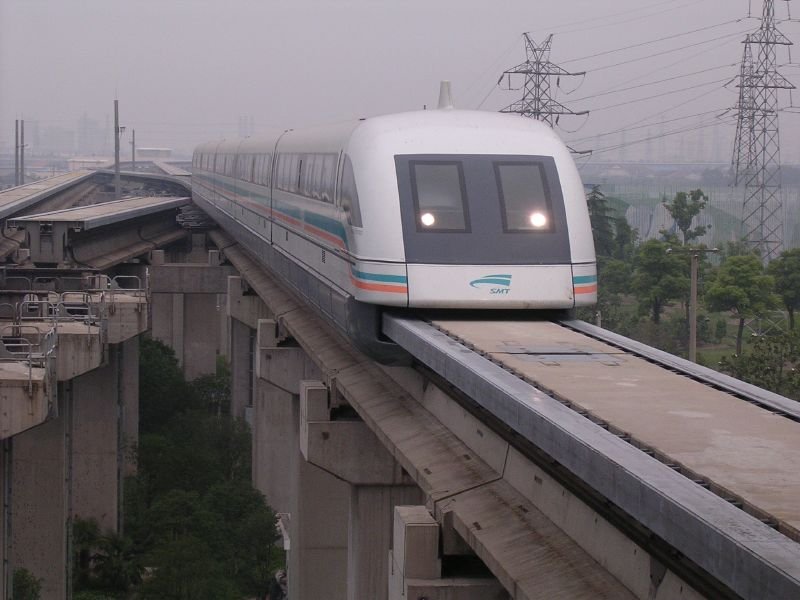 The Maglev Train in Shanghai
The Maglev Train in ShanghaiSource: http://commons.wikimedia.org/wiki/File:Maglev_june2005.jpg
Author: JakeLM

Subway Train
There is a subway station located between the two terminal buildings. The Metro Line 2 connects Pudong Airport to downtown Shanghai. In my opinion, this is the best option for visitors. As Metro Line 2 is part of the Shanghai subway system, you can transfer to other lines within the system. And it's way cheaper compared to the maglev. The same journey by subway to Longyang Road costs only RMB 6; going to People's Square in downtown Shanghai costs RMB 7, and to Hongqiao International Airport just RMB 8, an absolute bargain. Don't compare the speed - it's no match to the maglev.
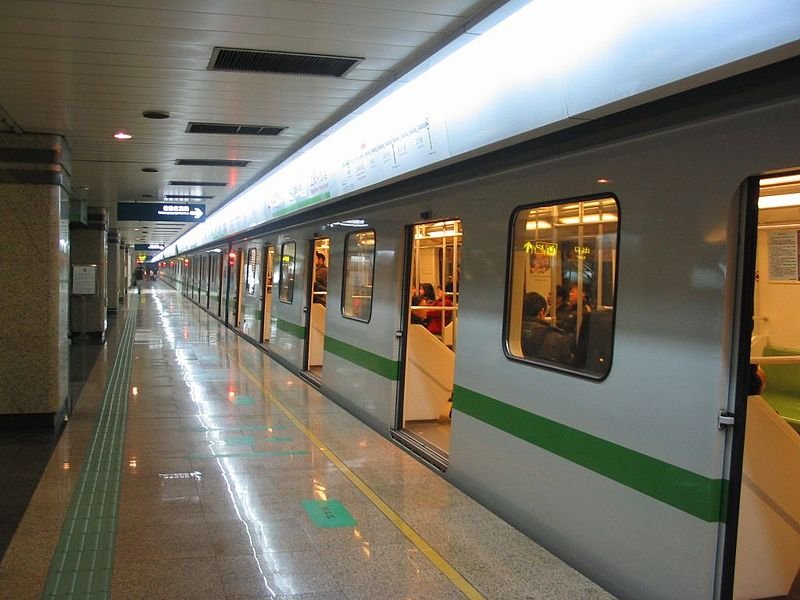 Shanghai Metro Line 2 at the Science & Technology Museum Station
Shanghai Metro Line 2 at the Science & Technology Museum StationSource: http://commons.wikimedia.org/wiki/File:Shanghai_Science_%26_Technology_Museum_Station.jpg
Author: Baycrest

Departing from Pudong International Airport
The Departure Hall is on Level 3. Make sure you know which terminal your flight is departing from.Terminal 1: Air France, China Eastern Airlines, China Express Air, East Star Air, Hainan Airlines, Japan Airlines, Juneyao Airlines, KLM Royal Dutch Airlines, Korean Air, Shenzhen Airlines, Sichuan Airlines and Spring Air.
Terminal 2: Air Canada, Air China, Air India, Air Macau, Air New Zealand, Air Ukraine, Alitalia, All Nippon Airlines, American Airlines, Asiana Airlines, British Airways, Cathay Pacific, Cebu Pacific, China Southern Airlines, Delta Air Lines, Dragonair, Emirates, Finnair, Garuda Indonesia, Lufthansa German Airlines, Malaysia Airlines, Northwest Airlines, Philippine Airlines, Qantas, Qatar Airways, Royal Brunei Airlines, Royal Nepal Airlines, Russian Airlines, Shanghai Airlines, Singapore Airlines, Thai Airways, Transaero Airlines, United Airlines and Virgin Atlantic.
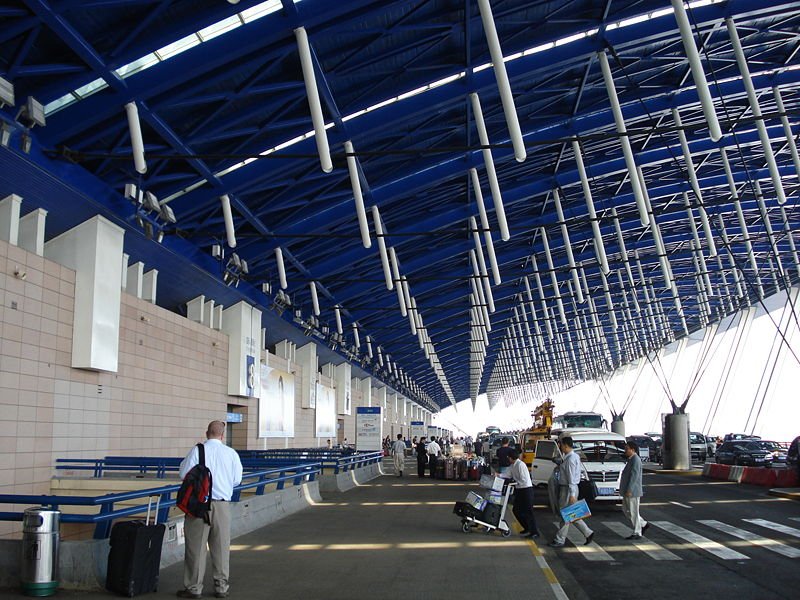 Curbside, Shanghai Pudong International Airport
Curbside, Shanghai Pudong International AirportSource: http://commons.wikimedia.org/wiki/File:Shanghai_lotnisko_Pudong_04.JPG
Author: Kwz

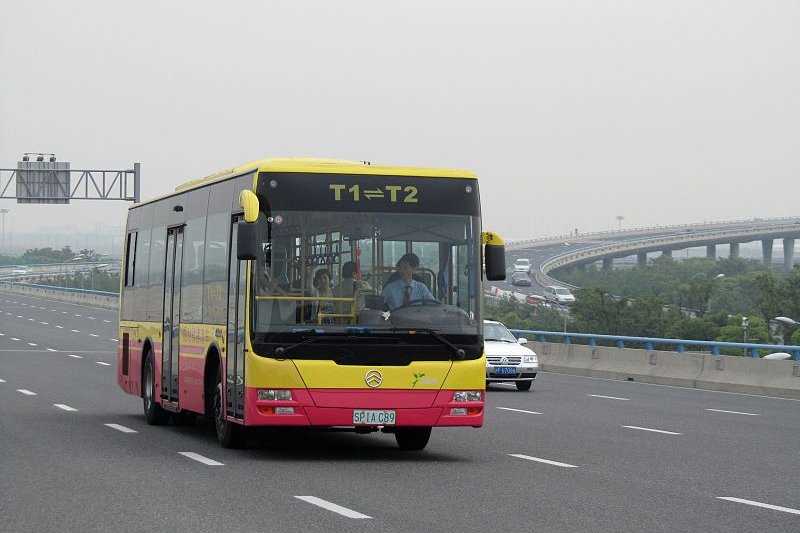 The shuttle bus that goes between Terminals 1 and 2 of Shanghai Pudong International Airport
The shuttle bus that goes between Terminals 1 and 2 of Shanghai Pudong International AirportSource: http://commons.wikimedia.org/wiki/File:Shanghai_Pudong_Airport_T1-T2bus.JPG
Author: S37

Transfering between Terminals 1 and 2
There is a shuttle bus going between the two terminals of Pudong International Airport. It runs every ten minutes and make the journey in five. To take the bus, go to Exit 1 of the domestic departure level or Exit 8 of the international departure level in Terminal 1, or Exit 27 of the domestic departure level and Exit 23 of the international departure level in Terminal 2.Alternatively, you can walk. There are three corridors between the two terminals. You will pass over the Yingbao Expressway and Maglev train station located between the terminals.
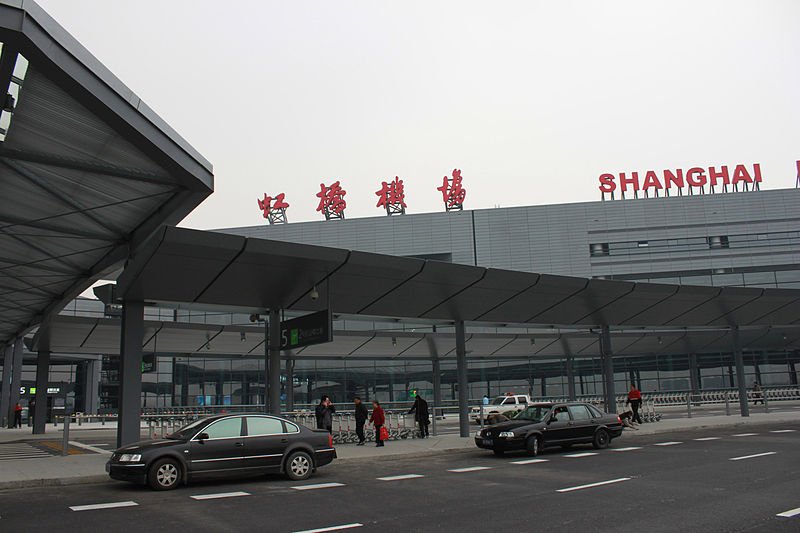 Shanghai Hongqiao International Airport Terminal 2
Shanghai Hongqiao International Airport Terminal 2Source: http://commons.wikimedia.org/wiki/File:Shanghai_Hongqiao_Airport_Terminal_2.jpg
Author: Jucember

Transfers between Pudong and Hongqiao International Airports
It takes an hour to go by taxi between these two airports. The distance is 60 km and the fare is around RMB 240 (from 5:00 am to 11:00 pm) and RMB 310 during the after hours. A cheaper option is to take the shuttle bus. There is one every 20 minutes or so. It takes an hour and costs RMB 30. For more details, call 021-6834 6612.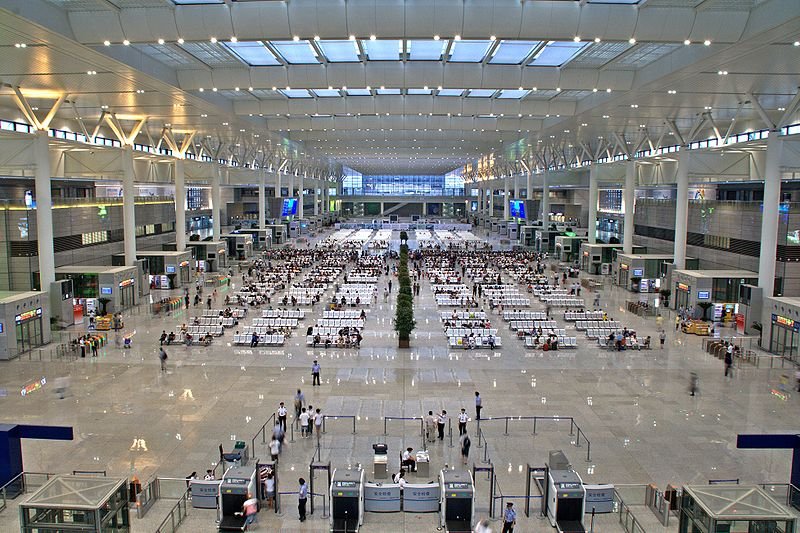 Shanghai Hongqiao Railway Station
Shanghai Hongqiao Railway StationSource: http://commons.wikimedia.org/wiki/File:2010-07-22_Shanghai_Hongqiao_Railway_Station_waiting_hall.jpg
Author: Patrick Nagel

You can reach Hongqiao International Airport by taking the same Metro Line 2 subway. It passes through downtown Shanghai and then continues to the cavenous Shanghai Hongqiao Railway Station. The fare is just RMB 8. This huge railway hub is connected to the new Terminal 2 of Hongqiao International Airport. Like Pudong, there are two terminals at Hongqiao, but it is quite impossible to walk between them, as Terminals 1 and 2 at Hongqiao are separated by the airport runway. Most airlines use Terminal 2, but if you need to go between terminals here, take the shuttle bus. The bus stop is at the south side of Gate 6 of departure hall in Terminal 1, and north side of Gate 1 in the arrival hall of Terminal 2. There's one every 15 minutes - every 5 minutes during peak hours. Journey between these two terminals take 15 minutes. Alternatively the Metro Line 10 also passes between the two terminals.
There is a plan to built a Maglev train line connecting Pudong Terminal 2 to Hongqiao Railway Station, but as of time I write this, though the station at Terminal 2 is ready, the Maglev line has not been built. Unless the maglev train goes to downtown Shanghai or to Hongqiao International Airport, I would give it a miss.
 Latest updates on Penang Travel Tips
Latest updates on Penang Travel Tips
 Map of Roads in Penang
Map of Roads in Penang
Looking for information on Penang? Use this Map of Roads in Penang to zoom in on information about Penang, brought to you road by road.
Copyright © 2003-2025 Timothy Tye. All Rights Reserved.

 Go Back
Go Back